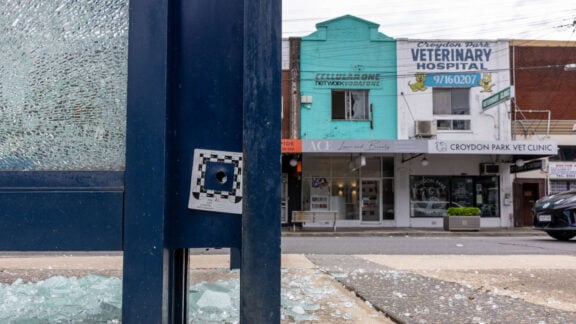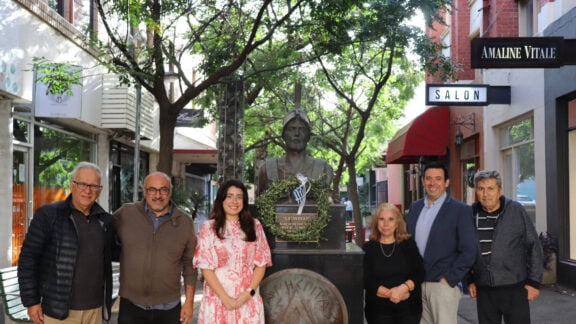When I was in primary school, my five syllabic Greek surname was the longest in the class at 12 letters long. Everyone seemed to struggle with it. Each day during roll-call the classroom filled with giggles and sometimes even jeers as the teacher clumsily stumbled over each letter like it was a block in an obstacle course. Every day was the same.
“Gly-ko.”
“Gly-kok-alo.”
“Gly-koka-loka-lala-mos.”
Every day my cheeks coloured with inadequacy and my shoulders rolled slightly inwards in my attempt to make myself even smaller, to match the insignificance that I felt. I always thought my name was long enough without having to add more letters to it, and yet that’s exactly what everyone seemed hell-bent on doing. It didn’t make any sense. I didn’t understand why my name was so controversial. G-L-Y-K-O-K-A-L-A-M-O-S. It was phonetic, after all.
Over time, I grew accustomed to the negative attention that my name brought. There wasn’t a day that I didn’t expect to hear a snide remark made about it. Kids can be cruel, we all know that, but it wasn’t the kids that made me feel out of place, it was the grown-ups. Whether it was at school, the doctor’s office, or the dental clinic, my name inspired a strange combination of despair and contempt. I was frequently asked why my family hadn’t anglicised it to make it easier for everyone to pronounce, why it hadn’t been shortened, and why it was so darn long.
I hardly know when it happened, but at some point along the way, I began to apologise for my name and I didn’t even know that I was doing it. Every time someone chastised me about my name or flippantly massacred it, leaving a pile of disfigured consonants behind, it was me that apologised. I anticipated every complaint, eye roll, and sigh, and met each with a light-hearted quip hiding my hurt and chagrin.
It wasn’t until someone suggested that I must be eager to turn 18 so that I could legally change my name to something shorter and less “Greek,” that I first recognised the burning bitterness of resentment well up inside me. My long name might have caused me some irritation over the years, but I never wished my name away. I never resented it. I never dreamt of swapping it for another.
My name is unique to me, my family, and my heritage. My father has told the story of our name’s origin countless times. Sitting at the dinner table pouring himself a glass of home-made red wine of indeterminate alcoholic content, he would tell me stories of the past; a soft, understated pride finding a way to seep through a creaky gap in his emotion-filled voice signalling that these weren’t just stories.
Each time I listened very carefully, my entire body stiff under the strain of complete focus. I paid close attention to every word, every description, and every subtle change in my father’s expression. Then I’d repeat the words I’d just heard over and over in my mind, like a child reciting lines for a school play. Each time I committed more detail, more colour, more feeling to memory. I captured as much of it as I could, building up a cumulative richness in my mind so that in the end what I had wasn’t just a story, it was a vivid and complete snapshot of life.
It all began in Kalymnos, the small, idyllic island in the Dodecanese where my father was born and lived before coming to Australia during the migration frenzy of the 1960s. Life on the island was tough in the late 1800s. Unlike mainland Greece which had regained its independence after the Revolution of 1821, the islands of the Dodecanese begrudgingly remained under Ottoman control. The island’s main source of income was its trade of sea sponges, but diving for sponges was a dangerous pursuit, evidenced by the long stream of mourning women wearing black.
My father explained that like many other young Kalymnian men raised on the shores of the Aegean Sea, my paternal great-grandfather was a very strong swimmer, but this alone did not make him a successful deep-sea diver. Divers needed more than stamina and healthy lungs to survive and thrive in their profession. They needed to understand that the ocean was temperamental. It could provide financial comfort and security and then take it away in an instant. The ocean could swallow a man whole, his smug pride as conqueror of the deep sea the first thing to be devoured.
In the early days, “skin” divers lunged themselves naked into the ocean while holding onto a 15kg stone called a skandalopetra that helped them sink quickly to the ocean floor. “Naked?” I’d yelped out incredulously. My father had responded with a dismissive nod. In future retellings, he’d always leave that part out.
Then came the rudimentary skafandro diving suit which transformed diving missions from small enterprises to big business ventures. Suddenly, divers could reach depths of 70 and 90 metres, causing them to succumb to the dreaded decompression sickness.
Men would emerge from the depths of the ocean doubled over and limp, blood running from their noses, unable to move. Those who died were considered lucky, while the crippled men who lived, shrunk into the grandness of their shame; once virile and strong, they were now weak and useless. A pained expression crossed my father’s face when I asked him how a dead man could possibly be lucky. There was no answer, but a moment later all signs of anguish were gone, the troubling memory that had darkened his gaze washed away like a message written in the sand.
In those days, men would spend months abroad diving for sponges off fishing vessels called kaikia. My great-grandfather travelled with his brothers on sponge diving missions along the Mediterranean Sea where their reach extended as far as the Libyan coastal town of Benghazi.
One year there was a shortage of sea sponges, so to make the journey to Africa as fruitful as possible, my great-grandfather had to search for some other commodity to take back to Greece to trade. It was in Alexandria, Egypt where he found plentiful sugarcane. He took a chance and he and his brothers loaded up their fishing vessel and returned to Greece.
Back in Kalymnos, they sold the sugarcane to the locals who enjoyed the delicate sweetness. Pretty soon my great-grandfather came to be known as the sugarcane man and like so many Greek surnames born from nicknames or occupations, the name stuck. From then on, Kalymnians referred to my great-grandfather as “Zaharokalamos” which directly translates to sugarcane.It didn’t take long before the name “sugarcane” morphed into “sweet cane” or Glykokalamos. And that’s how it’s remained ever since.
I don’t apologise for my name anymore and I haven’t for a very long time. For the most part, things are different now. Sometimes, people even ask about my name and whether it has any particular cultural significance. I’m always eager to share my family story with them; the story about how my sponge-diving ancestors came to be famous sugarcane merchants.
*This article was first published in n-SCRIBE 15.









